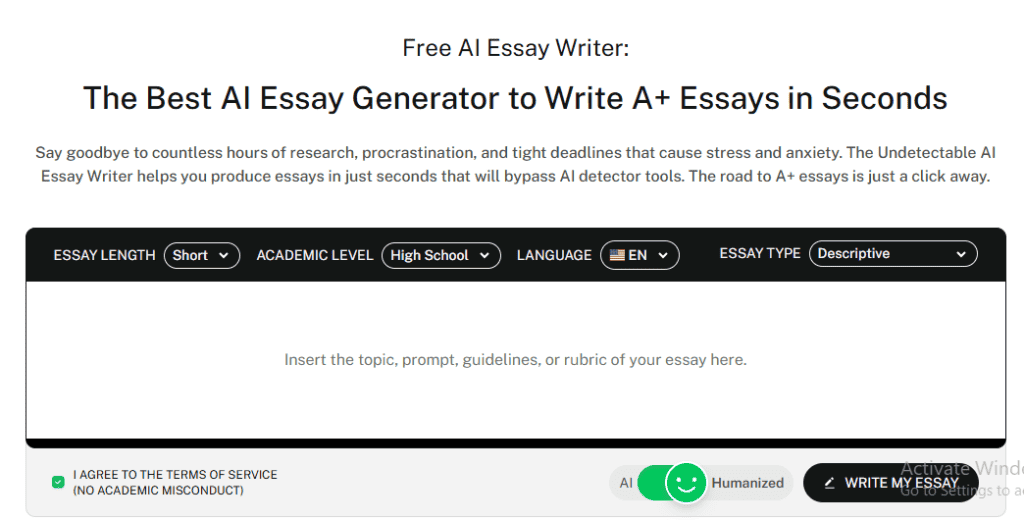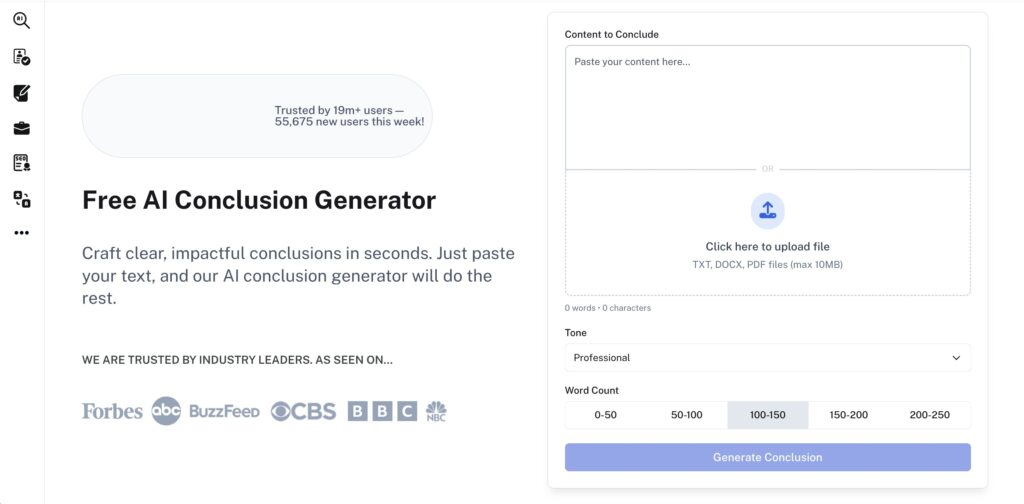An analytical essay could have you staring at a blank screen for hours while the cursor blinks at you like a taunt.
You know you’re supposed to analyze, but every time you try, it turns into a jumble of ideas that don’t really make sense.
The problem is not that you don’t know how to write an analytical essay.
Instead, breaking down your thoughts and structuring them clearly and properly is where you struggle.
But don’t worry, you won’t struggle with it for long.
By the time you finish reading this article, you’ll know all the necessary steps to write an analytical essay.
What is an Analytical Essay?
When you’re writing an analytical essay, you’re basically working as an investigator who looks at every tiny detail, connects the dots, and then draws a big, mind-blowing conclusion.
In other words, an analytical essay requires you to explore a specific topic in great detail.
It could be a book, a movie, a painting, a historical event, or even a social issue.


Never Worry About AI Detecting Your Texts Again. Undetectable AI Can Help You:
- Make your AI assisted writing appear human-like.
- Bypass all major AI detection tools with just one click.
- Use AI safely and confidently in school and work.
And no, you can’t do the job by merely summarizing it.
You should be able to explain how exactly you discovered your stance and drew your conclusion.
For instance, if you’re writing about a movie, you can’t just say, “It’s sad.”
That’s not how it works. Explain why it’s sad.
Perhaps the lighting is dim. The music may be slow.
Or maybe the main character was staring at the sky, feeling lost. That’s what you call an analysis!
However, there’s a small twist to it. You can’t talk about your personal opinion or emotions in an analytical essay.
It has to be objective because it’s not a persuasive essay.
You’ll have to stick to facts, logic, and evidence.
This raises a question: isn’t an analytical essay the same as an argumentative one, then?
Well, let’s find out!
Difference Between an Analytical & Argumentative Essay
At first glance, the difference between an argumentative and an analytical essay might not seem like much.
However, the way we approach these two types of essays is entirely different.
For example, let’s circle back to our movie example.
For an analytical essay, you’ll break down the elements of the film. You could talk about its story, characters, themes, music, and more to explain how everything worked together.
Notice how you’re only discussing the contribution of different elements instead of arguing over whether or not the movie is good or bad?
You do the exact opposite in an argumentative essay!
For argumentative essays, you pick a side and defend it. Let’s say, in the movie example, you could argue that this was the best romance film of all time.
Now, your job here is to present your personal opinion in front of the readers.
Common Topics for Analytical Essays
To give you a better sense of the difference between analytical and argumentative essays.
Here are a few common topics for analytical essays:
- How World War II changed global politics
- How social media has changed activism
- The role of fear in shaping human behavior
- How childhood experiences influence adult relationships
- The concept of happiness across different cultures
Now, let’s get to the real deal and learn how to write an analytical essay in 5 simple steps.
How to Write an Analytical Essay (Step-by-Step Guide)
Not everyone’s born with a keen eye for detail, so exploring and analyzing isn’t really our cup of tea.
That’s why, instead of starting with the basics of how to write an introduction for an analytical essay, let’s give you a quick fix
Undetectable AI’s Essay Writer can help you write analytical essays in no time, and we’ll show you how.
Here are the steps you can follow.
Step 1: Select a Topic
Topics are mostly pre-assigned. Yet, if you get the opportunity to choose, pick wisely.
The perfect topic is specific enough to dive deep but broad enough to find plenty of sources.
For example, if you choose a topic like “Technology’s impact on human history,” you’d barely scratch the surface in a single 1500-2000 word essay.
But if you narrow it down to “How smartphones have changed social interactions in the last decade,” you have something manageable.
That said, don’t zoom in too much. Something like “The impact of iPhone notifications on concentration during lunch breaks” might leave you struggling to find enough material.
Step 2: Research & Study
Before you start wondering how to write a thesis statement for an analytical essay, there are other important things to focus on.
Never jump into the writing part as soon as you choose a topic.
Instead, take the time to research the topic thoroughly.
Gather your sources, note down any references you’ll be needing later, and collect any evidence and data you plan on presenting.
Step 3: Create an Outline
With a good, elaborate outline, you take out the guesswork from the actual writing process.
While you’re doing the research, it’s best if you note down the points in the order you’ll be talking about them.
By the time you’re finished, you’ll know exactly how to start and end the essay on a strong note.
This means you won’t have to spend an hour simply worrying about how to write a conclusion for an analytical essay!
Step 4: Start Writing
Your ideas might be crystal clear in your head, but getting them onto paper? That’s a whole different challenge.
In such scenarios, Undetectable AI’s Essay Writer can be a game-changer!
Here’s how you use it to write an analytical essay:

- Enter your topic in the prompt box.
- Select your preferred essay length: short, medium, or long.
- Choose your academic level: high school, university, or doctorate.
- Pick your language.
- Set the essay type to analytical.
- Click “Write My Essay” and let the magic happen!
Step 5: Revise & Proofread
Once your essay is ready, take the time to review and refine it.
You don’t want any section to feel too aggressive or too weak.
Cross-check everything with your research to guarantee accuracy.
Also, make sure the writing flows naturally and is free of errors.
Analytical Essay Structure & Formatting Tips
The structure and format of your essay are just as important as the content.
Simply learning how to write a thesis for an analytical essay won’t earn you a good grade if your writing is structured and formatted poorly.
Here are some tips you must keep in mind.
Arrange Your Ideas Properly
A well-structured essay follows a clear order. Start with simple claims and build up to more complex arguments.
Introduce background information early to set the stage for your discussion.
Above all, make sure every point you make ties back to your thesis so your essay is focused and meaningful.
Use a Chronological Structure
The chronological approach, aka the cause-and-effect method, is one of the perfect ways of structuring an essay.
Basically, you just tell the story in the order things happened, connecting the dots along the way.
Think of it like explaining why your alarm didn’t go off, which made you late, which led to you skipping breakfast, which resulted in you regretting all your life choices by lunchtime.
Simple, right?
Justify Your Text
You don’t want your readers to feel like they’re lost in a maze while going through your essay.
The way your text is aligned plays a big role in how neat and readable it looks.
Most essays appear the cleanest when you use the Justified’ alignment.
This evens out the text along both the left and right margins.
It keeps everything looking tidy and makes your work easier on the eyes.

Once your ideas are mapped out and your arguments are clearly in place, the final step is tying it all together — and that’s where many writers hit a wall.
Our AI Conclusion Generator can help you close with confidence by synthesizing your key insights and reinforcing your thesis in a way that feels natural and thoughtful.
It’s especially useful for analytical writing, where the conclusion needs to echo your critical thinking without simply repeating what’s already been said.
With just a few clicks, you’ll have a final paragraph that brings your essay full circle and leaves a strong impression.
How AI Can Help Improve Your Analytical Essay
Using AI for essays isn’t without its controversies.
However, it can certainly improve the quality of your essays as long as you use it as a tool for help and not as a shortcut to doing the work for you.
Following are just a few ways you can use these tools to your benefit.
Essay Writer
This AI Essay Writer is perfect for those days when you just don’t feel like writing but still need a well-structured essay.
It takes your ideas and turns them into clear, organized writing without the struggle.
All you have to do is adjust the settings to fit what you need, and the tool will handle the rest. It’s quick, easy, and gives you great results every time!
AI Detector
Sometimes, using AI-generated content isn’t allowed or might not be the best choice. In such situations, our AI Detector can come in quite handy.
It will carefully scan your text and will accurately tell whether it was written by a human or generated by AI.
This is useful if you need to make sure your writing sounds natural or if you want to check a piece of content before submitting it.
AI Humanizer
Let’s say you used the AI detector, and most of your essay is flagged. What then? Well, the AI Humanizer offers a simple solution.
AI-generated text can sound a little too stiff or unnatural, and that’s why it’s easy to tell a machine wrote it!
This tool takes AI-generated content and converts it into something more natural, engaging, and human-like.
It smooths out awkward phrasing, adds more conversational flow, and makes sure your writing feels authentic.
SEO Writer
You can’t write a strong analytical essay in a jiffy. It takes time, research, and a well-structured argument.
But if you’re running out of time, the AI SEO Writer can help you by making your ideas clearer, refining your structure, and ensuring your writing is easy to follow.
It will help you organize your thoughts, improve readability, and even make your thesis stronger with well-supported arguments.
Plus, it can enhance your vocabulary and sentence flow so your essay sounds more professional.
AI Chat
Studying is always more fun and effective when you have a study buddy to bounce ideas off of.
But if you don’t have one, this AI chatbot is the perfect replacement!
You can share your ideas with it for feedback, ask it to generate new ones, or even have it review your essay before you submit it.
And, if you need help structuring your thoughts, it can even create an outline.
Undetectable AI offers a range of AI tools designed to make writing fun and convenient for all.
You can explore more such tools here or try our AI Detector and Humanizer in the widget below!
FAQs About Writing an Analytical Essay
How Do You Start an Analytical Essay?
Start your analytical essay by giving readers ample background information to understand your argument.
However, make sure you do so in an engaging manner. Your introduction must be able to hook the reader!
How Long Should an Analytical Essay Be?
The length of an analytical essay is not fixed for all cases. It can be anywhere between 500-1500 words based on the type of assignment and the complexity of your topic.
Do Analytical Essays Need a Conclusion?
Yes, like all other types of essays, analytical essays also need a conclusion. The conclusion must tie all the loose ends together and leave readers with a final thought on the significance of your chosen topic.
Wrapping Up!
Learning how to write an analytical essay for the first time can feel like a lot. But mark our words, it gets easier with practice. After a couple of tries, you’ll get the hang of it.
As long as you follow the tips above, it’s not as tricky as it seems.
Plus, one of the biggest perks of living in the digital age is having access to AI tools.
Whenever you’re stuck, Undetectable AI is there to help you brainstorm ideas, structure your essay, or refine your writing.
So, if you’ve been putting off that assignment, now’s the time to grab your pen (or keyboard) and get going!
